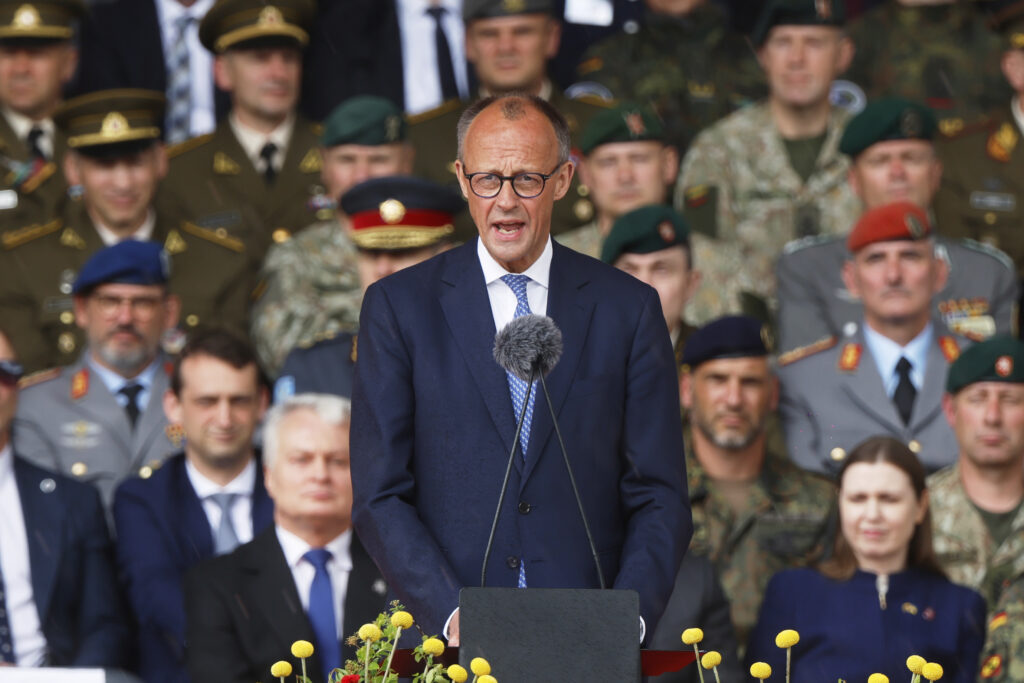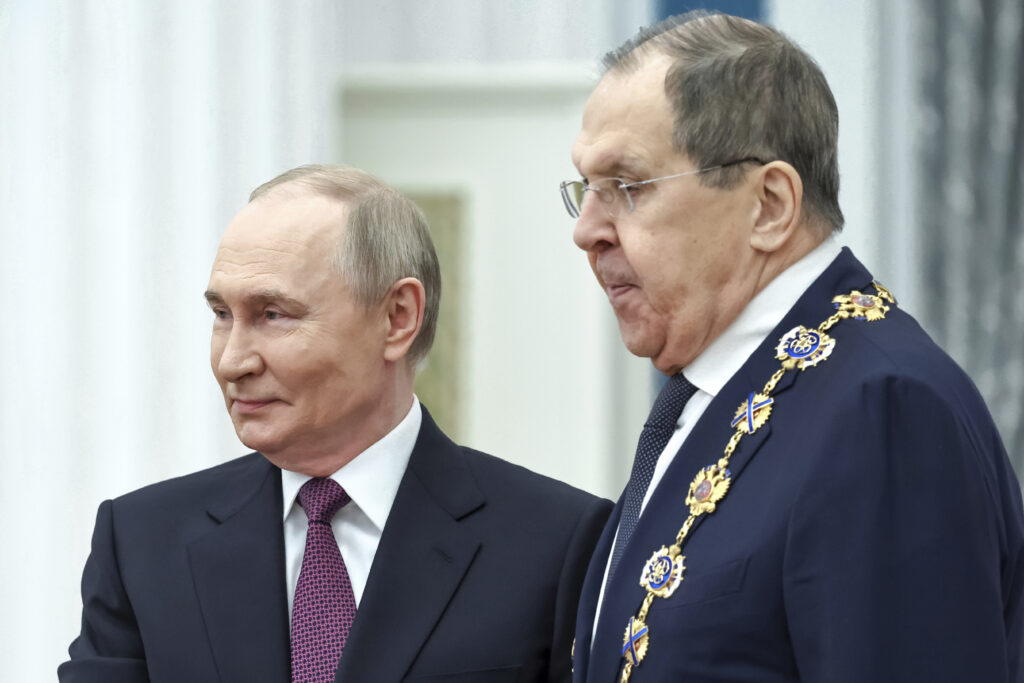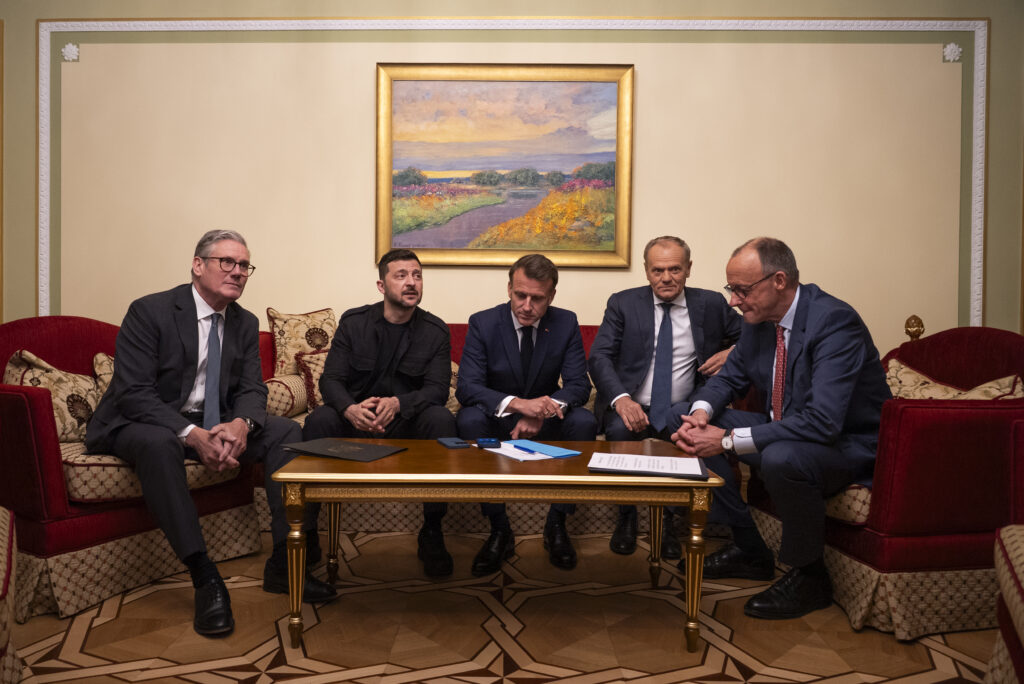Germany Steps Forward To Fill Uncle Sam’s Boots in Europe
Trump’s goal for the continent may be coming true, as allies increase their defense spending.

President Trump’s European dream may be coming true. Yesterday, Germany became the latest — and largest — European country to commit to spending 5 percent of its GDP on defense. With Chancellor Merz’s decision, Germany joined Poland and the three Baltic nations in aiming for 5 percent. Mr. Trump demanded this target in a speech to European leaders on January 23.
Next month, at the North Atlantic Treaty summit at the Hague, most of the alliance’s 32 member nations are expected to commit to spending 3.5 percent on core defense and 1.5 percent on road, rail, and ports that support military operations. America’s ambassador to NATO, Matthew Whitaker, has warned that Mr. Trump will only attend an upcoming June 24-25 summit if there is a 5 percent commitment.
Germany’s new conservative government is on board with this formula. Germany’s new foreign minister, Johann Wadephul, said: “The result is the 5 percent that President Trump has called for, and we will follow him in this respect.”
The money is there. Mr. Merz has committed Germany to half-a-trillion dollars in defense spending. On Wednesday, European Union ambassadors signed off on a $170 billion arms purchasing fund, known as Security Action for Europe. To qualify for funding, 65 percent of a project’s value must come from companies based in the EU, Britain, or Ukraine.

Dating back to President Eisenhower, American leaders have complained that Western Europe was not paying its fair share for defense. A decade ago, alliance members promised to spend 2 percent. This year, 23 countries meet that goal. Today’s change comes about partly due to arm twisting by Mr. Trump and partly due to the rising Russian military threat.
After Mr. Trump failed to persuade President Putin on Monday to join a cease-fire, the war resumed in earnest this week. The Russian defense ministry said yesterday it shot down 485 Ukrainian drones over a 48-hour period. In Ukraine’s largest air assault in months, dozens of drones flew toward Moscow, where all four international airports suspended flights.
Internet and mobile telephone service were suspended in three regions below drone flight paths. Around the Kremlin, the Russian army deployed armored vehicles equipped for electronic warfare and drone jamming. Ukraine claims to have hit two defense factories, Russia’s second-largest oil refinery, at Ryazan, and a military exposition center near Moscow, Patriot Expo.
On the other side, Russia is massing troops near Ukraine’s northeast border. The aim is to create “a security buffer zone,” Mr. Putin says. “Our armed forces are currently solving this problem. Enemy firing points are being actively suppressed, the work is under way,” the Russian president said yesterday during a visit to Russia’s Kursk border region.

The Washington-based Institute for the Study of War said Wednesday that the visit was televised nationwide “to justify the renewal of Russian plans to seize Sumy City and illegally annex Sumy Oblast.” Sumy is a regional capital of 255,000 people only 16 miles west of the Russian border. Ukraine already has evacuated 56,000 civilians from the border region.
In the southeast, Russian military bloggers said, Russian units advanced yesterday around Pokrovsk, a regional city that Russia has been trying to take since July. The Kremlin spokesman, Dmitry Peskov, said yesterday that Mr. Putin will visit Ukraine’s occupied cities of Donetsk and Luhansk, calling them “Russian regional capitals.”
On Tuesday, Mr. Trump appeared to wash his hands of the Russia-Ukraine war, saying: “This is a European situation. It should have remained a European situation.”
As the Trump administration abdicates leadership of Europe’s defense, Germany’s new conservative government steps forward. “Our goal is to provide in future all financial means necessary for the Bundeswehr to become Europe’s strongest conventional army,” Herr Merz said yesterday in Lithuania to mark the inauguration of a German army Panzer brigade near the capital, Vilnius.
“Anyone who challenges NATO must know that we are prepared. Anyone who threatens an ally must know that the entire alliance will jointly defend every inch of NATO territory,” he said to the cheers of onlookers waving German and Lithuanian flags. He vowed: “Protecting Vilnius is protecting Berlin.”

As Washington pulls back after 80 years of serving as Europe’s umpire and guarantor, age-old rivalries are resurfacing. Last week London’s ITV News blared a headline that could have been written 100 or more years ago: “Germany wants a stronger army than the UK.” The Telegraph headlined: “Germany must have stronger army than Britain, says Merz.” With doubts mounting that America would face down nuclear-armed Russia, debate has started in unofficial German circles about building a German atom bomb.
For decades the Kremlin has sought to drive a wedge in the transatlantic alliance, to create a split between America and Europe. However, in reaction to today’s split, Europe is arming at a rate not seen since the 1930s. One reason is the Kremlin’s shrill rhetoric against Europe.
“Macron, Merz, Starmer, and Tusk were supposed to discuss peace in Kiev. Instead, they are blurting out threats against Russia,” the deputy chairman of Russia’s security council, Dmitry Medvedev, posted on X after the leaders of France, Germany, Britain, and Poland traveled by train to meet President Zelensky at Kyiv.
Referring to Ukraine’s World War II nationalist partisans, Mr. Medvedev, a former president of Russia, added: “Either a truce for the respite of Banderite hordes or new sanctions. You think that’s smart, eh? Shove these peace plans up your pangender arses!”
A television talk show host, Vladimir Solovyov, who is Mr. Putin’s most-watched propagandist, responded to the European leaders’ visit by calling them “dirtbags” and their countries “Nazi nations” that deserve to be incinerated. He ended his eight-minute-long tirade with this wish: “You want a cease-fire — and I want your death.”

